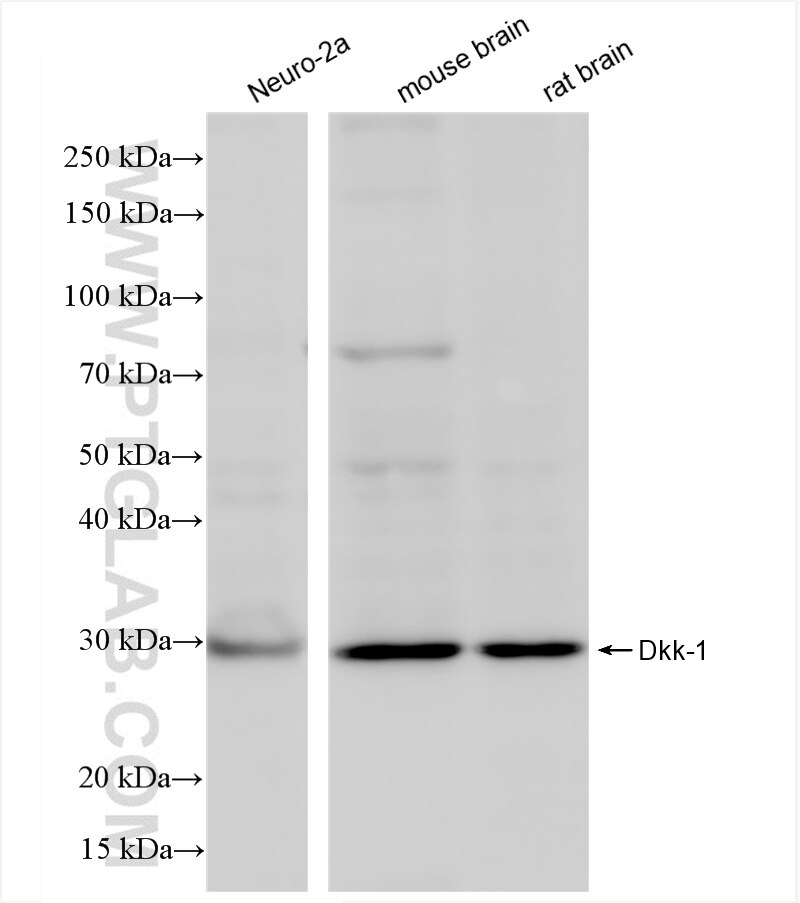Validation Data Gallery
Tested Applications
| Positive WB detected in | Neuro-2a cells, mouse brain tissue, rat brain tissue |
Recommended dilution
| Application | Dilution |
|---|---|
| Western Blot (WB) | WB : 1:1000-1:4000 |
| It is recommended that this reagent should be titrated in each testing system to obtain optimal results. | |
| Sample-dependent, Check data in validation data gallery. | |
Product Information
86207-1-RR targets DKK1 in WB, ELISA applications and shows reactivity with mouse, rat samples.
| Tested Reactivity | mouse, rat |
| Host / Isotype | Rabbit / IgG |
| Class | Recombinant |
| Type | Antibody |
| Immunogen |
CatNo: Eg4649 Product name: Recombinant Mouse DKK1 protein (rFc Tag) Source: mammalian cells-derived, pHZ-KIsec-N-rFc Tag: N-rFc Domain: 32-272 aa of NM_010051.3 Sequence: TLNSVLINSNAIKNLPPPLGGAGGQPGSAVSVAPGVLYEGGNKYQTLDNYQPYPCAEDEECGSDEYCSSPSRGAAGVGGVQICLACRKRRKRCMRHAMCCPGNYCKNGICMPSDHSHFPRGEIEESIIENLGNDHNAAAGDGYPRRTTLTSKIYHTKGQEGSVCLRSSDCAAGLCCARHFWSKICKPVLKEGQVCTKHKRKGSHGLEIFQRCYCGEGLACRIQKDHHQASNSSRLHTCQRH 相同性解析による交差性が予測される生物種 |
| Full Name | dickkopf homolog 1 (Xenopus laevis) |
| Calculated molecular weight | 29kDa |
| Observed molecular weight | 30-35 kDa |
| GenBank accession number | NM_010051.3 |
| Gene Symbol | Dkk1 |
| Gene ID (NCBI) | 13380 |
| Conjugate | Unconjugated |
| Form | |
| Form | Liquid |
| Purification Method | Protein A purification |
| UNIPROT ID | O54908 |
| Storage Buffer | PBS with 0.02% sodium azide and 50% glycerol{{ptg:BufferTemp}}7.3 |
| Storage Conditions | Store at -20°C. Stable for one year after shipment. Aliquoting is unnecessary for -20oC storage. |
Background Information
DKK1, also named a SK and Dickkopf-1, belongs to the dickkopf family. DKKs play an important role in vertebrate development, where they locally inhibit Wnt regulated processes such as antero-posterior axial patterning, limb development, somitogenesis and eye formation. In the adult, Dkks are implicated in bone formation and bone disease, cancer and Alzheimer disease. SDS-PAGE and Western blot analysis demonstrated that DKK1 is expressed as a 35-kDa doublet protein, which is larger than the deduced molecular mass of 26 kDa. Sometime DKK1 is expressed as a 42- to 50-kDa secreted protein, with little change observed after glycanase treatment.
Protocols
| Product Specific Protocols | |
|---|---|
| WB protocol for DKK1 antibody 86207-1-RR | Download protocol |
| Standard Protocols | |
|---|---|
| Click here to view our Standard Protocols |

